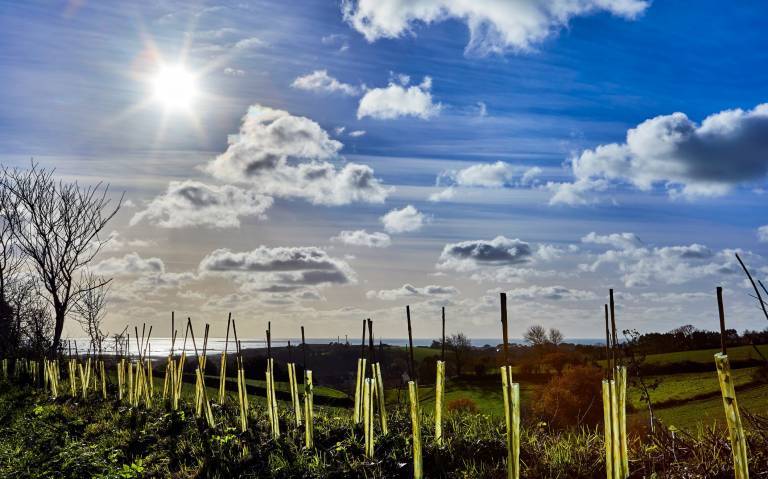Finding plastic-free alternatives to protect young trees
27 August 2021
Saplings should be planted without protective plastic guards, according to an environmental impact study led by UCL researchers.

Young trees are usually planted in plastic tubes to protect them from being eaten by animals, but these plastic guards often break down into harmful microplastics.
Manufacturing the guards also contribute to a range of environmental impacts, including fossil depletion, climate change and land use.
For the study, published in Science of the Total Environment, researchers carried out a Life Cycle Assessment (LCA), where they compared the environmental impact of planting trees with and without shelters, also looking at the different types of shelter available. An LCA is a cradle-to-grave analysis to assess environmental impacts associated with all stages of a tree’s life. The work focused on the UK, but the results and conclusions are valid for other temperate oceanic regions.
Young trees are usually grown in nurseries until they are between four months and three years old, after which plastic tubes are used to protect the trees for at least five years.
The plastic guards are often left to degrade, but even if they are collected and recycled, the carbon footprint of planting the tree is at least double that of plastic-free planting.
The researchers concluded that planting trees without shelters led to the smallest amount of carbon emitted and was overall the best option.
When used, polypropylene shelters are preferable to most bio-based alternatives, including polylactic acid-starch blends and bio-polypropylene. This is because there are additional environmental impacts associated agricultural processes for producing biomass.
The study doesn’t include the environmental impact of microplastics from degrading shelters as this can’t yet be quantified, but the authors say this would likely further show that not using shelters is the most environmentally friendly method.
The findings come as the Woodland Trust announces it is aiming to stop using plastic tree guards by the end of the year
Lead author, Research Fellow Charnett Chau (UCL Chemical Engineering), said: “Our study shows that if we only consider Climate Change (or carbon footprint), tree shelters do not have much environmental impact. This is because the amount of carbon sequestered by a tree over its lifetime (25 years) is significantly higher than the amount of carbon emitted due to the manufacturing of shelters and planting activities. However, if we consider a full range of environmental impacts, then planting trees without shelters is environmentally preferred.”
Co-author Professor Mark Miodownik (UCL Mechanical Engineering), said: “Start with the premise you’re not going to use plastic tree guards. Use them if it’s the only feasible way to protect the trees in that location.
“We have an established practice of using tree guards and we couldn’t find any real evidence where anyone had carefully calculated the impacts of either scenario. Now we’ve done it, and what we showed is that you can manage the land in a different way.”
The Woodland Trust is trialling plastic-free options, including cardboard and British wool.
Professor Paola Lettieri (UCL Chemical Engineering): “Reforestation is a key strategy to achieve net-zero carbon emissions targets. Our research demonstrated what factors and scenarios need to be considered when planting new trees; the LCA results indicate that planting seedling without shelters is overall the best option from an environmental perspective, even when compared to best-case Prospective Scenarios for shelters-aided planting.
"Our future work will continue to investigate different alternative materials for the manufacture of tree shelters for those locations where their application remains the best practical solution.”
Darren Moorcroft, Woodland Trust CEO, said: “The stark reality is without tree protection, young trees don’t stand much chance. Across the sector, plastics have long been the first port of call turned to as the option due to their longevity and ability to protect the saplings from predators.
“But of course, they don’t biodegrade and are not environmentally friendly. We all need millions of new trees, want to turn the industry on its head once and for all and we have the chance to finally solve this puzzle through new sustainable approaches to tree establishment.”
The study was funded by UKRI with support from Professor Paola Lettieri’s LCA Group, the Woodland Trust, Alba Trees, Rainbow Ltd and Danielle Purkis
Links
- Research paper The environmental performance of protecting seedlings with plastic tree shelters for afforestation in temperate oceanic regions: A UK case study in Science of the Total Environment
- Charnett Chau’s academic profile
- Andrea Paulillo’s academic profile
- Professor Mark Miodownik’s academic profile
- Professor Paola Lettieri’s academic profile
- UCL Mechanical Engineering
- UCL Chemical Engineering
- UCL Engineering
Image
Media contact
Kate Corry
Tel: +44 (0)20 3108 6995
Email: k.corry [at] ucl.ac.uk
 Close
Close

